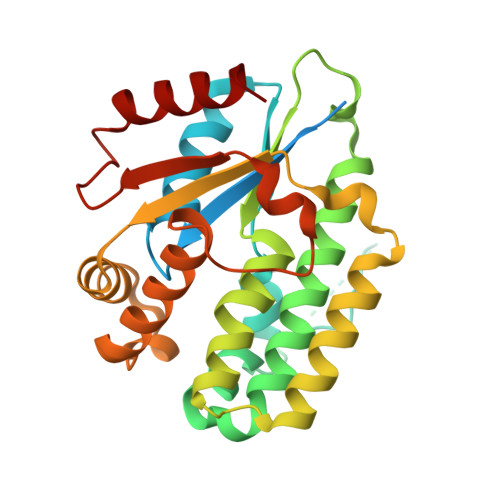Dual protein kinase and nucleoside kinase modulators for rationally designed polypharmacology.
Hammam, K., Saez-Ayala, M., Rebuffet, E., Gros, L., Lopez, S., Hajem, B., Humbert, M., Baudelet, E., Audebert, S., Betzi, S., Lugari, A., Combes, S., Letard, S., Casteran, N., Mansfield, C., Moussy, A., De Sepulveda, P., Morelli, X., Dubreuil, P.(2017) Nat Commun 8: 1420-1420
- PubMed: 29127277
- DOI: https://doi.org/10.1038/s41467-017-01582-5
- Primary Citation of Related Structures:
5MQJ, 5MQL, 5MQT - PubMed Abstract:
Masitinib, a highly selective protein kinase inhibitor, can sensitise gemcitabine-refractory cancer cell lines when used in combination with gemcitabine. Here we report a reverse proteomic approach that identifies the target responsible for this sensitisation: the deoxycytidine kinase (dCK). Masitinib, as well as other protein kinase inhibitors, such as imatinib, interact with dCK and provoke an unforeseen conformational-dependent activation of this nucleoside kinase, modulating phosphorylation of nucleoside analogue drugs. This phenomenon leads to an increase of prodrug phosphorylation of most of the chemotherapeutic drugs activated by this nucleoside kinase. The unforeseen dual activity of protein kinase inhibition/nucleoside kinase activation could be of great therapeutic benefit, through either reducing toxicity of therapeutic agents by maintaining effectiveness at lower doses or by counteracting drug resistance initiated via down modulation of dCK target.
Organizational Affiliation:
Centre de Recherche en Cancérologie de Marseille (CRCM), INSERM, CNRS, Aix-Marseille Univ, Institut Paoli-Calmettes, Equipe Labellisée Ligue, Marseille, 13009, France.

















